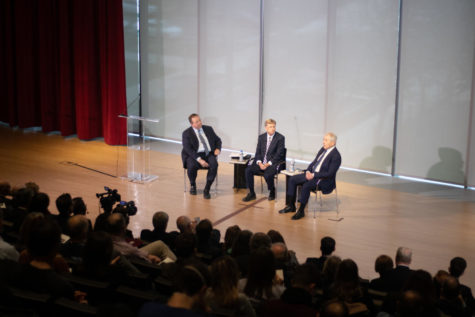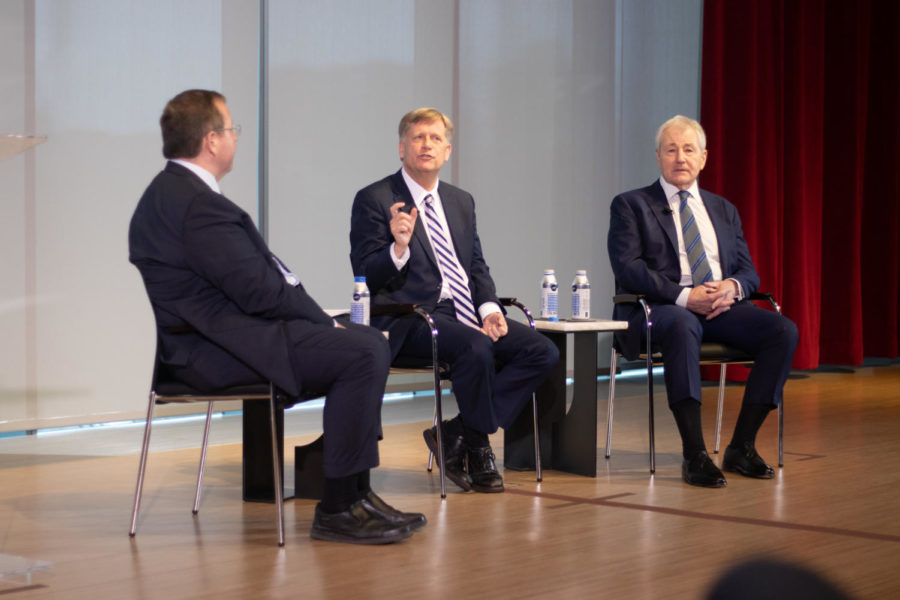The Chicago Project on Security and Threats (CPOST) hosted a conversation between former U.S. Secretary of Defense Chuck Hagel and former U.S. Ambassador to Russia Michael McFaul at the David Rubenstein Forum on March 24. At the discussion, moderated by professor of political science and director of CPOST Robert Pape, McFaul and Hagel spoke about the invasion of Ukraine and the West’s role in the conflict.
McFaul and Hagel began the conversation by analyzing how Ukraine is standing its ground against Russia’s larger, more modernized military. McFaul emphasized the role of Ukrainian president Volodymyr Zelenskyy in maintaining the morale of his troops.
“When asked to go to Krakow and run the government in exile, [Zelenskyy] said ‘I don’t need a ride, I need ammunition.’ That was an incredibly important, beautiful decision,” McFaul said. “The miscalculation that [Russian [resident Vladimir] Putin made was that the Ukrainian people would just walk away,” Hagel said, emphasizing the importance of Zelenskyy’s resolve and the broader Ukrainian resistance.
In addition to Zelenskyy, Hagel praised U.S. President Joe Biden’s ability to maintain and mobilize support from other North Atlantic Treaty Organization (NATO) nations.
“It’s been such a spectacular achievement that Biden could have achieved with the West to keep 30 nations together,” he said, referencing the American-led effort to impose targeted sanctions on Russian oil oligarchs and provide military assistance to Ukraine.
Hagel contrasted Biden’s commitment to the NATO partnership with the position of the Trump administration. “[If] Donald Trump would have been president, this would have taken a whole different approach. Donald Trump’s the one that during his four years said we ought to disband [NATO],” Hagel said.
Despite commending the West for mobilizing in opposition to Russia’s invasion of Ukraine, both speakers said that the U.S. urgently needed to ramp up their shipments of strategic weapons and armaments to the Ukrainian military.
“What Putin is doing systematically to Ukraine is completely destroying the infrastructure, the energy, roads, bridges and businesses.” Hagel said. “What that does is wear people down. I have never thought that time is on the side of the Ukrainians.”
Hagel said he did not think that Ukraine could sustain the conflict without another major shipment of arms. “Getting more intense, sophisticated weaponry in there now can make a difference,” he said.
McFaul added that Putin “will not stop fighting until he either takes the territory he wants or his army can’t fight,” communicating the need to send “more weapons, more attack guns, more long-range missiles, more jets” to Ukraine.
McFaul said he thought that aside from Ukrainian casualties, a Russian takeover would have larger implications on the health of other global democracies, namely Taiwan, where popular support for independence is high, but where any formal move for sovereignty is inhibited by Chinese sanctions or military power projection
“[Russia] is a dictatorship that invaded a democracy,” he said. “If we allow that to happen, we allow military force to undermine democracies, and that makes democracies around the world who have autocratic neighbors very nervous.”
Hagel argued that the U.S. was obligated to aid Ukraine by maintaining its post-World War II policy of policing autocratic regimes and protecting fledgling democracies.
“The reason the U.S. is unable to leave the war is because we’re the only country that has a real power base that voices emphasis on human rights and freedom in humanity,” Hagel said. “We’ve been able to continue that since World War II.”

When the speakers were asked about the trajectory of the war and the likelihood of a peace deal negotiation in the coming months, McFaul said he was pessimistic.
“I don’t hear at all, anywhere, that Putin wants to negotiate right now,” he said. “He doesn’t care how many of his soldiers die in Bakhmut as long as he has people to die in Bakhmut.” The Ukrainian mining town of Bakhmut has seen some of the war’s most intense fighting.
McFaul believes Ukraine is just as unlikely to come to the bargaining table.
“President Zelenskyy is not looking to negotiate right now,” he said. “Look at the public opinion in Ukraine. They want to fight to the death. They are doing that because of the way Putin has terrorized the country.”
However, Hagel cautioned U.S. policymakers against increasing or relying on sanctions as a deterrent.
“I’m not against sanctions, but they’ve got to be placed, timely, smart, and they’re not the answer to everything,” Hagel said.
McFaul argued that Western sanctions could not affect the Russian economy enough to decrease public support for the war, especially in light of the fact that countries such as China and India are continuing to source large amounts of oil and gas from Russia.
“My view on this particular case is we do not have enough economic power to bring about the results we want,” he said. “The Chinese and Indians are buying Russian oil and gas.”
Instead, McFaul advocated sanctions that target Russia’s military capabilities. “We need better sanctions for a very precise outcome, to reduce the money and technology that [Putin] has to fight in Ukraine.”
Audience member Ivo Daalder, former ambassador to NATO and president of the Chicago Council on Global Affairs, asked the speakers whether the US should go farther than military aid and support Ukraine’s bid to join NATO.
“It’s not just good enough that they want to join NATO,” Hagel reminded the audience. “There are certain requirements that a country has to commit to before they can be eligible. I don’t think that these are the forefront questions now because you’ve still got a war going on.”
Remaining pessimistic about Ukraine’s accession, McFaul sought to refocus the conversation on “the creative idea of bilateral military commitments with the US.”
“Nobody, including me right now, is answering the fundamental question. But I’m not optimistic that there will be a push for NATO membership after the war.”









